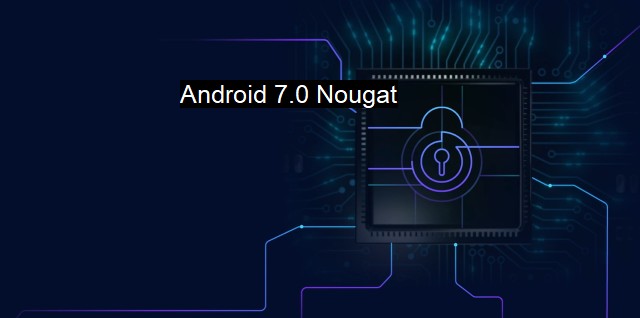What is Android 7.0 Nougat?
Enhanced Security Features of Android 7.0 Nougat: Protection Against Malware and Cyber Threats with Trusted Boot and Google Play Protect
Android 7.0 Nougat is an operating system (OS) designed and developed by Google for smartphones, tablets, and other smart devices. As the seventh major version of the Android system, it got its sweet name 'Nougat' in line with Google's tradition of naming their releases after desserts or sweet treats. Nougat, released in August 2016, came with a host of new features and enhancements, targeting multiplied performance, security, simplicity and consistency across devices.Security and antivirus functionality is a fundamental aspect when discussing an operating system like Android 7.0 Nougat. Smartphones contain so much personal information, such as banking details, contact lists, and media files. Consequently, they also become a significant target for cyber attackers. Google is aware of these threats and has made efforts in Nougat to step up the built-in security features.
One of the principal assets of Nougat is its security features for closing off potential cybersecurity risks. This Android version introduced a feature called Direct Boot, which permits encrypted smartphones to boot straight to the lock screen. Previously, you had to enter a decryption code to get your phone to even start up. This innovation ensures that if someone steals or finds your phone, they cannot get free access to all the data stored on the device.
Secondly, Android Nougat added a layer of security known as file-based encryption. Unlike the previous full-disk encryption which was an all-or-nothing approach, file-based encryption secures individual files with unique keys. This means intense protection for each file, making it even harder for cyber invaders to obtain vital data on your phone.
Another key feature is the parameters on app authenticity and verification. Android 7.0 Nougat restricts app installations from sources other than the Google Play Store. This doesn't essentially mean that users are prohibited from installing apps from third parties, but any app installed needs to pass through Google's verification process. This approach lessens the risk of injudicious app installations, providing an additional layer of security on top of what antivirus programs can offer.
One other significant change facilitating cybersecurity with Android 7.0 Nougat is reducing the scope of permissions needed by apps. Instead of giving apps carte blanche access to sensitive information, you can now limit what aspects of a phone certain apps can access. This crucial feature is empowering to users, giving control over what information apps can access, thus reducing the risk of data misuse.
Every Google Android version has built-in antivirus measures, and it doesn't discount to Android 7.0. Typically, following the Android ecosystem's principle, Google insulated Android systems with an application sandboxing method, which ensures data segregation. From a security perspective, this narrows the attack surface inhibiting inter-app attacks.
The Google Play Protect was also laced into the security infrastructure of Android Nougat. It's essentially a real-time malware scanner, scanning over 50 billion apps per day across various devices. In the event of any suspicious activity or malicious apps, it triggers and suspends the activity/app. Thus, it serves as a strong, proactive security protocol.
While Android 7.0 Nougat comes embedded with ideal provisions to maintain and fortify security, it’s imperative to remember no system is completely impervious. It's always essential to also have a reliable antivirus installed, update the systems and applications regularly, manage permissions thoughtfully, and avoid downloading from unknown sources to remain relatively protected on the cyber-front. User practices and stewardship play an equally crucial role alongside OS security features to ensure heightened digital safety.

Android 7.0 Nougat FAQs
What cybersecurity features does Android 7.0 Nougat offer?
Android 7.0 Nougat has several built-in cybersecurity features, such as file-based encryption, seamless updates, and direct boot. It also includes the Google Play Protect feature which scans all installed apps for malware and malicious behavior.Do I need antivirus software for my Android 7.0 Nougat device?
While Android 7.0 Nougat comes with built-in security features, it is still recommended to install antivirus software to provide an extra layer of protection against potential security threats. There are several antivirus apps available on the Google Play Store that can be installed on Android 7.0 Nougat devices.How can I keep my Android 7.0 Nougat device secure?
You can keep your Android 7.0 Nougat device secure by regularly updating your device to the latest security patches, using strong passwords, and enabling two-factor authentication. It is also recommended to install antivirus software and only install apps from trusted sources such as the Google Play Store.What should I do if my Android 7.0 Nougat device gets infected with malware?
If your Android 7.0 Nougat device gets infected with malware, you should immediately disconnect it from any internet connection and then run a malware scan using your antivirus software. You should then remove any detected malware and change any passwords that may have been compromised. It is also recommended to reset your device to factory settings if the malware cannot be removed.| | A | | | B | | | C | | | D | | | E | | | F | | | G | | | H | | | I | | | J | | | K | | | L | | | M | |
| | N | | | O | | | P | | | Q | | | R | | | S | | | T | | | U | | | V | | | W | | | X | | | Y | | | Z | |
| | 1 | | | 2 | | | 3 | | | 4 | | | 7 | | | 8 | | |||||||